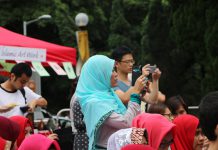University student Charis Lai Po-wa, 23, is tired of being labelled by older people. She follows hkelderlymemes on Facebook and sometimes shares its posts. Lai says the posts are entertaining and she can relate to them.

Although the posts can sometimes be quite mean, Lai says this does not necessarily mean youngsters who share them would disrespect the elderly in real life. One of the posts she shared features a picture in which an old woman walks in front of a camera while two youngsters are taking a photo. The caption says: “Useless youths even have time to take photos? Let me walk slowly first.” Lai thinks the posts on hkelderlymemes describe common phenomena and resonate with youngsters.
Lai is also an active member of Youngspiration, a political party established in early 2015. She volunteered for Youngspiration’s electoral campaigns during the 2015 District Council election and September’s Legco election. Lai feels strongly about what she sees as the short-sighted elderly who think that what will happen a few decades from now is none of their business.
“They may have made their choice without much consideration, and instead based it on some instant benefits, thereby sacrificing the possibilities of our future,” says Lai. “They underestimated the importance of their vote and the impact it can make.”
Despite the fact that many youngsters treat older people with suspicion, 57-year-old Ng Kam-chuen is still on their side. Although he is middle-aged, Ng considers himself to be young in mindset. An actor in the award-winning film Ten Years, he is also an activist who has participated in social movements in the past. Over the years, Ng has noticed that the disagreements between the generations have become more and more obvious.
As a father of two, Ng understands the hardships youngsters are facing – a society beset with problems, unaffordable housing, an unpromising future and a competitive job market where paltry incomes are not proportional to heavy workloads. Ng says it is understandable young people are dissatisfied with society. Labels like “useless youths” are just sneering remarks made by people of his generation who cannot sympathise with the young. “My generation enjoyed the best and most glorious time of Hong Kong,” he notes.
Still, Ng says there are more open-minded people in society than we think; it is just that many of them are not in the best position to directly voice their opinions. They might not be able to risk the consequences of speaking out because of their jobs or established social circles. Compared to students, older adults have too much to lose, and family responsibilities take precedence over fighting against authority.
As for the boundary between generations, Ng says the different social contexts in which different generations were brought up will always be a hurdle to achieving true understanding. Neither the young nor the old can appreciate each other’s difficulties in life. As a member of the generation in between, Ng does not know how to mediate the relationship either.

Simon Wong, a 72-year-old self-declared non-violent localist, is also known as the youngest of the three Uncle Wong’s in the Umbrella Movement. Wong stayed in the occupied sites throughout the 79-day occupation and also after police cleared the sites in December 2014.
The advances made during the early period of China’s reform and opening up policy (改革開放) gave Wong a positive view of Hong Kong’s handover to China in the 1980s. But the Tiananmen crackdown of 1989 destroyed his hopes and he is extremely disappointed with how things have gone since 1997.
However, he disagrees with the young localists who prefer a more violent approach to protest. He thinks these youngsters lack patience.
“They are not wrong. They’re constrained by their age,” Wong says. “When they’re only 20 years old, five years is a quarter of a lifetime … But for us elderly, five years pass in the bat of an eye.”
Wong has been criticised by other people of his age, but he does not begrudge them. He says the mainstream media present biased stories, which are often the only stories the elderly can read or watch. He adds that some politicians brainwash elderly people by handing out little presents such as mooncakes.
“They [politicians] grab a key point [for those elderly]: a narrow-minded nationalism,” he says. “But Hong Kong accepts a worldwide value. I am one of the Chinese people, but also a citizen in a global village.”









































